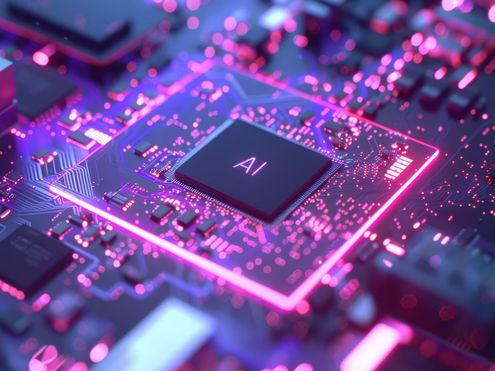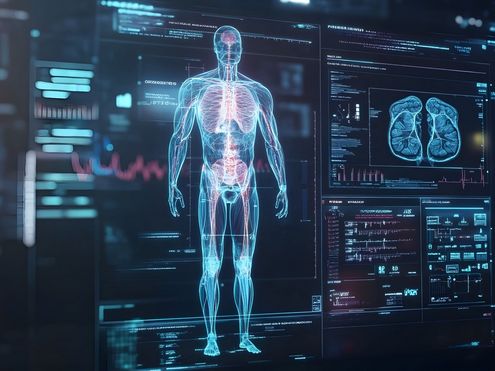


The LRZ supports science and research with IT and know-how, it also manages its own research and development projects and participates in international projects. The research focus is on developing and optimising hardware and software for supercomputing, on network, communication and storage technologies as well as on workloads for High-Performance Computing (HPC). Special attention is paid to sustainability: In co-design with tech firms, the LRZ has developed and further optimised the direct cooling of supercomputers using hot water, and we are also constantly exploring how to operate computing and supercomputing centres efficiently or how computers can reduce the amount of energy they consume.
Whether it’s data from modelling and simulation or images of satellites or measured values from sensor data in nature: The environmental sciences produce a wide variety of digital data and often require technical support for the processing of data. The LRZ is exploring useful transmission and processing methods, as well as harmonising data from various sources. For example, for Artificial Intelligence applications or for developing systems for disaster mitigation. When it comes to environmental computing, the V2C focuses on the visualisation of simulation results.
The hardware for supercomputing continues to become more heterogeneous in order to achieve better energy-efficiency. Software needs to be adapted to systems so that they can compute efficiently. The LRZ has installed the Bavarian Energy, Architecture and Software Testbed or BEAST, for conducting research into innovative IT: This is where the future of computing is being prepared, e.g. tools for controlling and monitoring supercomputers, and strategies for reducing the energy requirements of computing.
Artificial intelligence accelerates calculations and expands the set of methods in all scientific disciplines. But how reliable is AI? What data can be used to train systems? And how can the energy requirements of AI systems be reduced? The Big Data & Artificial Intelligence (BDAI) team explores AI applications, data strategies and innovative AI technologies to provide researchers with specialist support.
A picture is worth a thousand words: Immersive virtual reality applications also promote understanding in the sciences and fascinating images ultimately support communication strategies. Specialists at the Centre for Virtual Reality and Visualisation (V2C) at the LRZ are investigating how to present research from a technical perspective. In collaboration with researchers and providers, they develop tools and workloads for recording and processing image data.
Research data may contain more information than planned: Therefore, it should be reliably archived, as easy to search as possible and ultimately reusable and accessible. The professional management of research data is also becoming increasingly important for efficiency reasons. The LRZ handles digital information in line with the FAIR data principles and develops tools for managing data in the area of high-performance computing as well as platforms for publishing research outcomes, such as the LRZ Fair Data Portal.
In addition to tape and hard disk archives, the LRZ Cloud also stores research data. There, however, they require special protection against hacking and manipulation. In collaboration with research groups, the LRZ explores and develops tools and technology for securely storing research data or for creating a Trusted Research Environment, which includes, for example, technically implementing regulations for access rights to sensitive data or managing stored data.
How can openly accessible science be implemented from a technical standpoint? How can we guarantee the security of information in decentralised systems and infrastructures? And how do computing centres ensure their service quality? Research questions and projects of general importance have arisen as a result of LRZ’s certifications. Together with the Digitalverbund Bayern and universities, the LRZ is researching strategies and measures to secure digital information, to increase the resilience of computing centres, and to also maintain IT services even when crises strike, keyword: business continuity.
Efficient science and information management is becoming increasingly important for our research and innovation projects. The Research and Information Management Team develops and tests new tools for use within and beyond the LRZ. The team focuses on customising science management methodologies, a comprehensive Research Information System, and work on an open web search within the OpenWebSearch.EU project and Open Search Initiative.
The LRZ participates in research projects across the world and manages its own R&D projects. The computing centre is currently working on 56 projects in eight research programmes, which have led to a string of publications to date. The LRZ focuses on exploring and developing necessary technologies and also supports research teams in the areas of reserach coordination and research and information management.

HammerHAI (Hybrid and Advanced Machine Learning Platform for Manufacturing, Engineering, And Research @ HLRS) will…
The ScalNEXT (Scalable Network-centric EXecuTion) project deals with the optimisation of data management and the control…

The research project Serverless Scientific Computing and Engineering for Earth Observation and Sustainability Research…

DigiMed Bayern's goal is to guide Bavaria with a flagship project into this medicine of the future.

CLARA, the Center for Artificial Intelligence and Quantum Computing in System Brain Research, will use artificial…

dealii-X: an Exascale Framework for Digital Twins of the Human Body aims at developing a scalable, high-performance…
From supercomputing or citizen science, from visualisations to reliable data management and optimising programming languages: Here you will find scientific publications involving LRZ researchers. Explore the wealth of possible research topics at the LRZ.

Do you want to help develop the IT technology of the future? Find purpose working at LRZ and join our team. We are regularly looking for new colleagues.
The LRZ participates in research projects – as a technical partner and a service provider. We explore which computer resources are needed to collect, process and store data, support with managing research data or developing tools, interfaces, or software and platforms.
As far as possible, the LRZ also supports research groups in the application process for national or international research projects and during execution phase.
Do you have an idea for a research project but aren’t sure which institutes are eligible for funding or how to develop a plan?
We would also be happy to advise you on management questions and help you with making applications and coordinating projects. Draw on our experience.